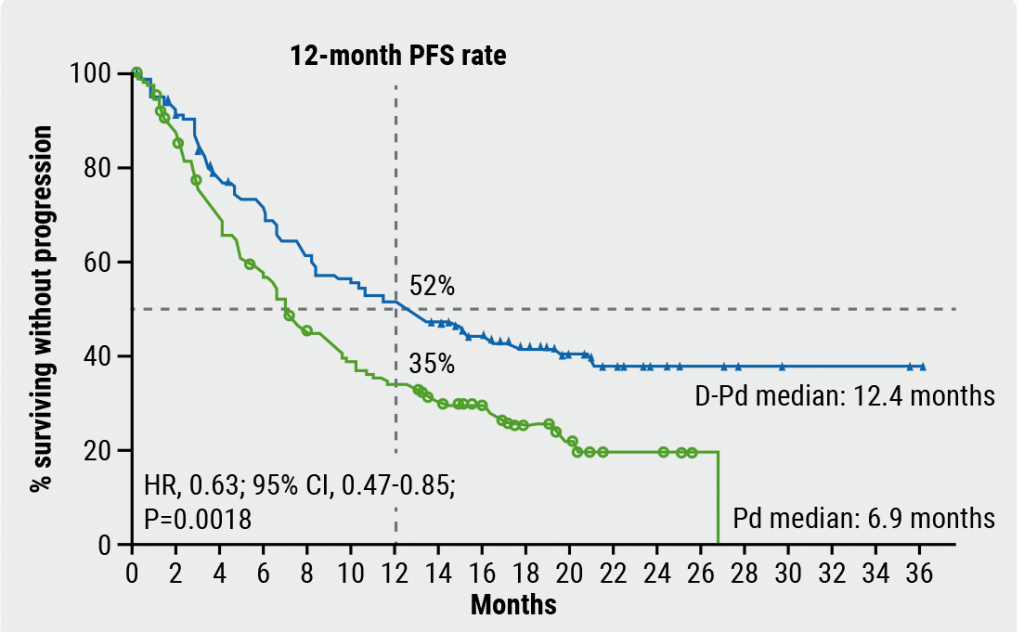Included patients had a median age of 36 years (range 18-73); 36% were adolescents and young adults. In total, 43 patients (53%) had B-cell ALL (B-ALL), 12 (15%) had Philadelphia chromosome-positive ALL, and 26 (32%) had T-cell ALL (T-ALL). Treatment for 55 patients consisted of allogeneic stem cell transplantation using matched sibling (47%), matched unrelated (31%), haploidentical (7%), partially mismatched (12%), and cord blood donors (3%).
A first remission was attained by 70 patients (88%), 4 (5%) died during the first 2 induction phases. The 2-year overall survival (OS) rate was 62% and the 5-year OS rate was 44%. Estimated 2- and 5-year leukaemia-free survival rates were 52% and 35%, respectively. Overall, disease relapse (31%), lethal infection (28%), and graft-versus-host disease (14%) accounted for most patient deaths. Of patients achieving first remission, 20 (29%) eventually relapsed after a median time of 9.8 months (range 1.1-69.3). Of 50 transplanted patients attaining first remission, 15 (30%) relapsed after a median time of 10.9 months (range 3.8-32.8).
Concerning OS, multivariate analysis revealed that increasing patient age (HR 1.026; P=0.035) as well as a higher number of clones detected with baseline cytogenetic analysis (HR 2.69; P=0.0002) were associated with inferior outcome. T-ALL patients experienced longer survival compared with B-ALL (87 vs 56 months; P=0.019). Patients transplanted using cord blood donors had inferior survival compared with transplants using matched sibling donors and fully matched unrelated donors (12.8, 71.3, and 73.4 months, respectively). Relapse-free survival was significantly better in patients with T-ALL compared with B-ALL (90 vs 50 months; P=0.039).
According to Dr Danielle Fredman (Sheba Medical Center, Israel), it is conceivable that, in the near future, novel therapeutic modalities for adult ALL involving the use of monoclonal antibodies and CAR T-cell therapy will help reduce relapse rates and further improve the current outcomes of patients treated on the GMALL protocol.
- Gökbuget N, et al. Blood. 2012 Aug 30;120(9):1868-76.
- Apel A, et al. Isr Med Assoc J. 2014;16:224-8.
- Fredman D, et al. Evaluating Outcomes of Adult Patients with Acute Lymphoblastic Leukemia Treated on the GMALL Protocol. 62nd ASH Annual Meeting, 5-8 December 2020. Abstract 982.
Posted on
Previous Article
« Strong correlation between peripheral blood and bone marrow NGS MRD Next Article
More severe COVID-19 outcomes for patients with haematologic malignancies »
« Strong correlation between peripheral blood and bone marrow NGS MRD Next Article
More severe COVID-19 outcomes for patients with haematologic malignancies »
Table of Contents: ASH 2020
Featured articles
COVID-19
More complicated course of COVID-19 in leukaemia patients
Older age and imatinib treatment associated with COVID-19 mortality in CML
Allogeneic SARS-CoV-2-specific T cells to treat COVID-19
More severe COVID-19 outcomes for patients with haematologic malignancies
Acute Lymphoblastic Leukaemia
Improved outcomes, but still substantial part experiences relapses
Strong correlation between peripheral blood and bone marrow NGS MRD
Encouraging outcomes after autoHCT in patients with ALL
Acute Myeloid Leukaemia
Prognostic validity of AML composite model in predicting mortality
Venetoclax plus hypomethylating agents in favourable-risk AML
Encouraging clinical activity of decitabine plus ipilimumab in R/R or secondary MDS/AML
AML patients with specific mutations are unlikely to achieve MRD
Comparable outcomes with gilteritinib or quizartinib in R/R AML
First-in-class macrophage immune checkpoint inhibitor in AML
Bispecific DART® as salvage therapy for primary induction failure and early relapse
Gilteritinib in R/R AML patients priorly treated with midostaurin or sorafenib
Addition of venetoclax provides an effective, lower-intensity regimen
Chronic Leukaemia
Bosutinib effective and well tolerated in newly diagnosed CP-CML
Efficacy and safety of ponatinib in patients with CP-CML who failed second-generation TKIs
First-in-class STAMP inhibitor versus bosutinib in resistant or intolerant CML
PFS and ORR benefits of first-line ibrutinib-based treatment in CLL
Multiple Myeloma
Validation of MY-RADS response assessment category criteria
High symptom burden in transplant-ineligible patients with newly diagnosed MM
Added value of ixazomib to lenalidomide plus dexamethasone in transplant-ineligible newly diagnosed MM
Survival of transplant-eligible newly diagnosed MM in FORTE trial
Better survival with upfront autoSCT versus bortezomib-based intensification
Subcutaneous daratumumab plus pomalidomide and dexamethasone in R/R MM
Melflufen well tolerated with encouraging activity in heavily pretreated R/R MM
Initial data of FcRH5/CD3 T-cell-engaging bispecific antibody
Lymphoma
CD58 aberrations limit durable responses to CD19 CAR T-cell therapy
Anti-CD19 CAR T-cell therapy in relapsed/refractory indolent NHL
Myeloproliferative Neoplasms
MPN disease burden, quality of life, and treatment patterns
Interventions in JAK/STAT signalling pathway
Novel, orally available inhibitor of BCL-XL/BCL-2
New insights into genetics of MPN
Immune Thrombocytopenia
Mycophenolate efficacious and tolerable, even in elderly patients
First-in-class antibody sutimlimab selectively inhibits classical complement pathway
BTK inhibition provides clinically active and durable platelet response
Haemophilia, Sickle Cell Disease, Thalassaemia
First results from gene therapy trial in haemophilia B
Impact of haemophilia on children and their caregivers
Promising CRISPR gene editing results in β-thalassaemia and sickle cell disease
Erythroid maturation agent in patients with β-thalassaemia requiring regular RBC transfusions
Related Articles

February 18, 2021
Subcutaneous daratumumab plus pomalidomide and dexamethasone in R/R MM
© 2024 Medicom Medical Publishers. All rights reserved. Terms and Conditions | Privacy Policy
HEAD OFFICE
Laarderhoogtweg 25
1101 EB Amsterdam
The Netherlands
T: +31 85 4012 560
E: publishers@medicom-publishers.com

